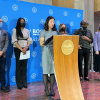Boston Mayor Michelle Wu signaled her intent to stand firm on her reform agenda and that she's bracing for opposition to her policy goals in remarks she made Tuesday to the Boston Municipal Research Bureau.
The BMRB, which was established in 1932 as an independent policy research organization, promotes itself as providing " objective and impartial research ” to encourage good governance.
Wu’s keynote address at the bureau's annual luncheon comes as she nears the end of her first 200 days in office. Her comments contained three big takeaways:
1. She’s sticking by her reform vision
Wu’s remarks were laced with references to some of her key reform items from the campaign trail, both ones she has acted on — like fostering municipal contract equity and proposing a plan to upgrade Boston Public Schools facilities — and ones she has yet to fulfill.
“We are at a crossroads, and the perception that inaction is somehow safer, that the status quo comes at no cost, simply isn't true,” she said, pointing to inequities laid bare by the COVID-19 pandemic.
Wu suggested local governments are best positioned to address those inequities with new ideas.
“We'll need to embrace the disruption that can accompany the kind of transformative changes we need right now. We must move away from putting Band-Aids on the symptoms of our problems and invest instead in tackling root causes. Here is where our greatest opportunities lie,” Wu said.
Given that Wu won the 2021 mayoral election with a decisive margin of nearly two-to-one — a victory that some political observers interpret as a mandate — her adherence to this agenda makes sense.
2. She’s anticipating naysayers
Wu opened her remarks with an historical reference to the arguments against Boston’s early subway system in the late 1800s.
“Today, we take great pride in the fact that we were the first city in the country to make this groundbreaking investment in public transit, innovating with the very first subway tunnel in the nation, but Boston didn't always feel that way,” said Wu, pointing to opponents’ aesthetic, commercial and superstitious concerns before Boston began running the subway in 1897.
“In fact, when it was first introduced, the idea to build an underground subway system was labeled dangerous and radical… Now, as someone who rides the [MBTA] to work on a regular basis, I won't tell you that it's perfect, but I think we can all agree that a Boston without any [MBTA] in any portion of the city, would not be a better Boston.”
Despite the 125-year time gap, Wu’s subtext is readily apparent, drawing a parallel between the opposition to a transit-related idea then, and now as she seeks to build momentum for free public transit in Boston.
For Wu to make these remarks before an organization that, historically, has taken a cautious approach to shifts in city policy suggests she is keenly aware of potential resistance to some of her more ambitious policy goals.
3. She’s using threads of Boston’s history to bolster her agenda talking points
In addition to public transit, Wu made a number of references to the city’s tradition of “pacesetting” in other areas like government, public education, medicine and healthcare.
She even referenced her own place in the city’s history, pointing out that upon reviewing letters addressed to future mayors from former mayors, she noticed that none of them anticipated a woman sitting in their place.
“They each began with some version of Sir or Dear Mr. Mayor,” Wu said of the missives she read from 1830, 1930 and 1981. “For all their determination to dream big and boldly about our future, not a single mayor imagined that someday, someone like me or Kim Janey before me would be mayor. And almost certainly they couldn't have imagined the resources and momentum available to us at this moment to implement lasting changes and build a foundation for a brighter future.”
It's a political technique Wu deploys constantly, looking back to link Boston’s storied past to the path she’s attempting to forge.
Its effectiveness will almost certainly be assessed by voters when her term as mayor draws to a close.








